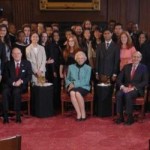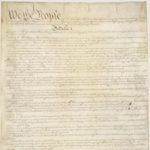In this unit, students will examine the roles that key American founders played in creating the Constitution, and the challenges they faced in the process. They will learn why many Americans in the 1780s believed that reforms to the Articles of Confederation were necessary, and the steps taken to authorize the 1787 Convention in Philadelphia. They will become familiar with the main issues that divided delegates at the Convention, particularly the questions of representation in Congress and the office of the presidency. Finally, they will see how a spirit of compromise, in the end, was necessary for the Convention to fulfill its task of improving the American political system.
The Twenty-fifth Amendment
This eLesson will provide students with an opportunity to learn about the text of the Twenty-Fifth Amendment as well as its historical usage and potential need. It will ask them to consider why such an Amendment was deemed necessary and how it has been, and could be, used. It will also give students the opportunity to debate possible applications of the Twenty-Fifth Amendment
Native American Cultures Across the U.S.
Teaching children about the First Americans in an accurate historical context while emphasizing their continuing presence and influence within the United States is important for developing a national and individual respect for the diverse American Indian peoples, and is necessary to understanding the history of this country.
Defining Classroom Citizenship
The founders understood that, in order to preserve their liberty and happiness, and that of future generations, the foundation of successful self-government was citizens who understood and applied certain virtues. They constructed the U.S. Constitution according to their study of the principles and virtues that were most necessary to sustain a free, prosperous, and orderly society. This lesson is ideal for the first day of school.
How the Law Regulates Who Votes

In this lesson, students will discuss what qualifications are necessary to vote. The activity presents a series of potential voters for a student council election, and asks that students either allow or prohibit each person from voting. After reflecting on their justifications, they will learn that states and the federal government have very few restrictions on voting. The instructor might then lead a discussion on the importance of voting to the democratic process
Constitutional Index – Necessary and Proper Clause
The Constitutional Index breaks down the U.S. Constitution by Section, Amendment, and Clause and contains broader topics and themes. These are used to cross-reference Library resources in an effort to annotate constitutional history.
The Constitutional Convention
In this lesson, students will use C-SPAN video clips to examine the founding principles that emerged from the Constitutional Convention as well as hear about some of the people who participated. Students will use this information to analyze the role the compromise played in the creation of the Constitution.
Act III: How Did the Constitutional Convention Work Out the Details of Government?
This short video examines the role played by the Committee on Detail in defining the powers of Congress, the most important of which were the power to tax and the power to regulate commerce. The Committee wanted to promote an interstate commercial republic and specified congressional powers to achieve that goal. According to Professor Gordon Lloyd, the inclusion of the “necessary and proper clause” was the most significant contribution of this Committee.
A Conversation on Judicial Independence

Justices Stephen G. Breyer, Anthony M. Kennedy and Sandra Day O’Connor and high school students discuss why an independent judiciary is necessary and how Article III, Section1, in the Constitution safeguards the role of judges. This video complements the documentary An Independent Judiciary: Cherokee Nation v. Georgia and Cooper v. Aaron.
